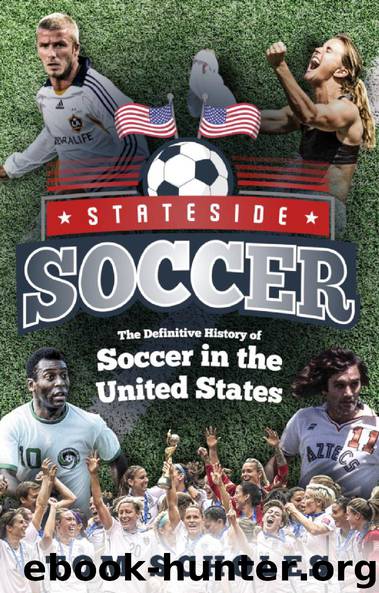Stateside Soccer by Tom Scholes

Author:Tom Scholes
Language: eng
Format: epub
Publisher: Pitch Publishing
Published: 2019-08-15T00:00:00+00:00
No one was really sure who was still on the pitch or if anyone got sent off at all, but one thing that was for certain in every report was the final scoreline, which was only brought about because of a mistake by the US. Charles Altemose made an error from a falling ball when he misjudged his own pass on the wet and damp surface, with goalscorer Frossi anticipating the mistake and taking full advantage of it. But the fact that the US lost wasn’t as much of a negative as perhaps you’d have expected because, despite their early exit, their ability to take the game to a bunch of Italian players who were either very young Serie A players or just very good Serie A players and to take them to half-time at level pegging was a vast improvement from their last meeting. While the 1936 Olympic Games ended in an early disappointment for the Americans, it should have been cause for optimism. Once again, hard work and determination was favoured by the Americans over technical ability and flair, but it served them better than perhaps any other nation. Was it pretty? No. Was it efficient and effective? Absolutely (to a degree), which is why it suited the Americans. They weren’t blessed with the talents that Italy and Uruguay had, but they were able to bridge the gap between the teams via their different style of play. But the efforts at the 1936 World Cup were in vain because of what was to follow.
The perfect opportunity to build the game of soccer in America had passed through the 20s and was about to pass through the 30s without any improvements made. Sure, the USMNT managed to reach a few World Cups and Olympics but with the exception of 1930 they never pulled up any serious trees. Losing just 1-0 to world champions Italy was a good result, but it wasn’t anything to write home about, certainly not if you consider yourself to be a top soccer nation. The following year the US played Mexico in an unofficial friendly series, with the Mexicans winning four games out of four, scoring 22 goals in the process and conceding just eight. This was an embarrassment for the US, and little did they know that their 5-1 loss to Mexico in Mexico City would be their final game for a decade, until they next played Mexico again in Havana, when they lost 5-0 and played worse after 10 years without a game. Of course, the outbreak of the Second World War prevented any nation from fully competing, but you can’t help but feel that the USMNT was on a downward spiral due to the condition of its own domestic league. The ASL had reformed at amateur level, meaning the United States did not have a professional soccer league. In fact, they would not have a professionally recognised league until the NASL in the 1960s, meaning there was a 30-year gap for the USA to bridge in order to become a soccer nation.
Download
This site does not store any files on its server. We only index and link to content provided by other sites. Please contact the content providers to delete copyright contents if any and email us, we'll remove relevant links or contents immediately.
The Inner Game of Tennis by W. Timothy Gallwey(3682)
Unstoppable by Maria Sharapova(3523)
Crazy Is My Superpower by A.J. Mendez Brooks(3398)
Urban Outlaw by Magnus Walker(3393)
Mind Fuck by Manna Francis(3182)
The Social Psychology of Inequality by Unknown(3023)
The Fight by Norman Mailer(2931)
Unstoppable: My Life So Far by Maria Sharapova(2501)
Accepted by Pat Patterson(2366)
Going Long by Editors of Runner's World(2360)
Futebol by Alex Bellos(2357)
Backpacker the Complete Guide to Backpacking by Backpacker Magazine(2244)
Sea Survival Handbook by Keith Colwell(2241)
The Happy Runner by David Roche(2234)
Motorcycle Man by Kristen Ashley(2232)
The Sports Gene: Inside the Science of Extraordinary Athletic Performance by David Epstein(2175)
Peak: Secrets from the New Science of Expertise by Anders Ericsson & Robert Pool(2033)
Endure by Alex Hutchinson(2023)
The Call of Everest by Conrad Anker(1908)
